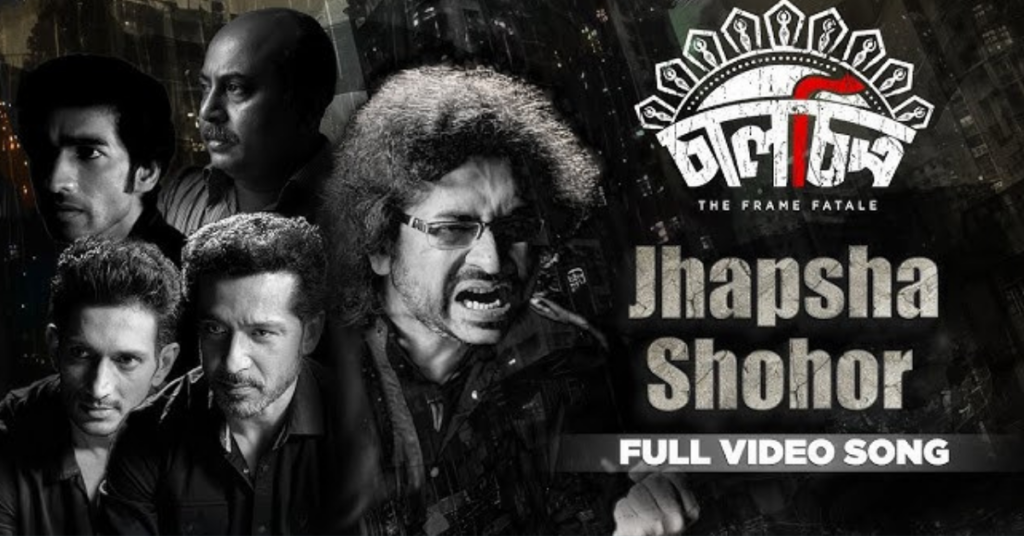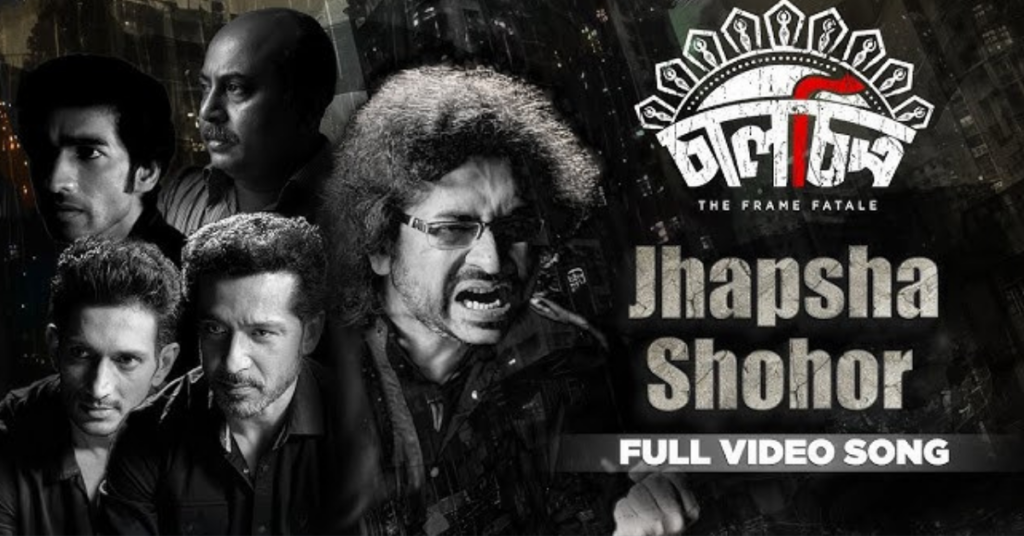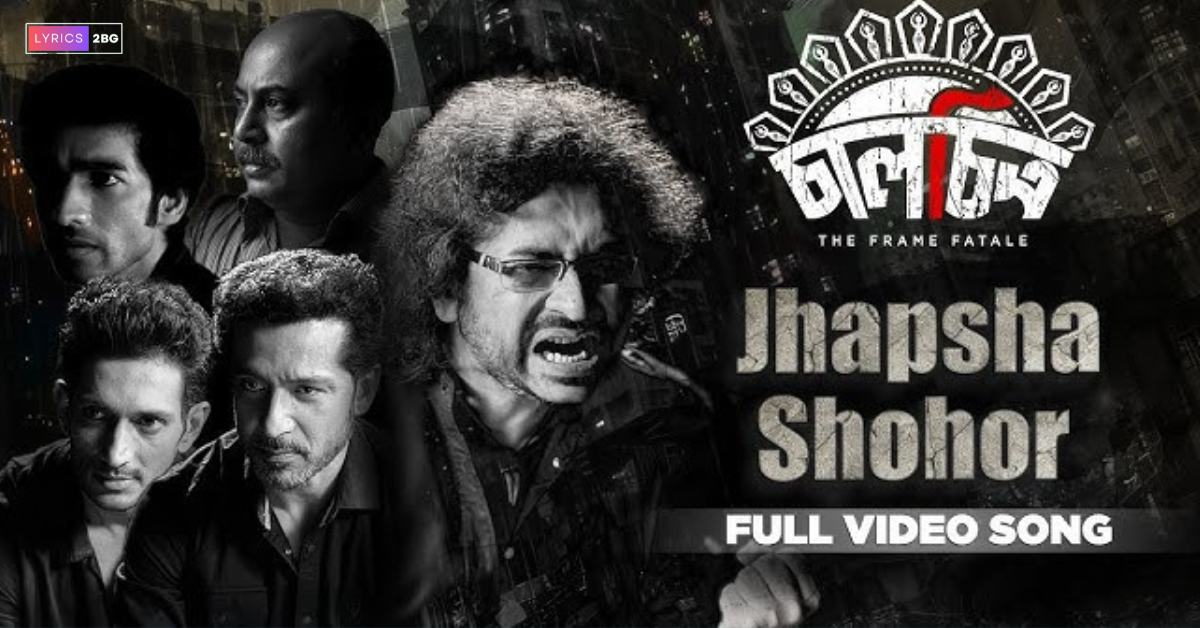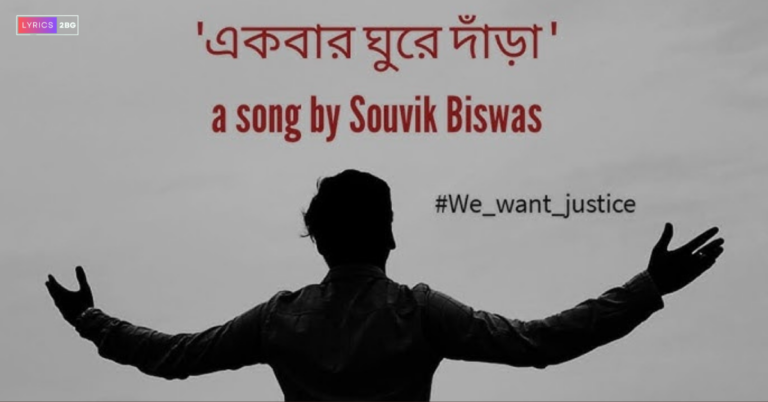Jhapsha Shohor Lyrics | Chaalchitro | Rupam Islam
Jhapsha Shohor Lyrics
ছায়া ছায়া, এলো ঘিরে
আলো হয়ে, এসো ফিরে।
মায়ায় বেঁধেছে কার সারারাত
ঘুমের অতলে জলপ্রপাত?
অঝোর ধারা বৃষ্টিতে
উদাসী কোন ঈঙ্গিতে
অঝোর ধারা বৃষ্টিতে
উদাসী কোন ঈঙ্গিতে
খুঁজছে যাকে সে
পাচ্ছে কাকে যে
ঝাপসা এই শহর আমার। (তোমার)
নিঝুম কোনো জ্যোৎস্নাতে
দুচোখে চাপা কান্নাতে
অভিযোগের চেনা স্বরে
দাবানলে পোড়া ঘরে
মরা জোনাকির ছেঁড়া ডানা
প্রজাপতিদের কবর খোঁড়ে।
নিঝুম কোনো জ্যোৎস্নাতে
দুচোখে চাপা কান্নাতে
খুঁজছে যাকে সে,
পাচ্ছে কাকে যে
ঝাপসা এই শহর আমার। (তোমার)
Meaning of Jhapsha Shohor Lyrics
Jhapsha shohor lyrics expression of longing, melancholy, and existential musings, intricately woven with metaphors of nature and urban solitude. At its heart, the song explores the universal human experience of searching for connection, purpose, and solace amidst the chaos and alienation of life.
Jhapsha shohor lyrics opening lines, “Shadows gather all around / Return as light, come back again,” set the tone for the duality that runs throughout the song—light versus shadow, hope versus despair, presence versus absence. The evokes a yearning for something lost, a longing for light to dispel the enveloping darkness. This could symbolize a person, a memory, or even a sense of inner peace that has been overshadowed by life’s trials.
Jhapsha shohor lyrics lines, “Whose spell has bound the night? / Cascades of dreams fall in the abyss of sleep,” capture a vivid and haunting image of being trapped in an emotional or psychological limbo. The “cascades of dreams” suggest unfulfilled desires and suppressed thoughts that tumble into the subconscious, evoking both the beauty and pain of yearning. Sleep here is not a refuge but a realm where these longings persist, unresolved.

Jhapsha shohor lyrics imagery of rain, particularly in “In the endless showers of rain / With a forlorn gesture unknown,” reflects a mood of desolation and mystery. Rain is often a metaphor for cleansing or renewal, but here it seems to underline a continuous, unrelenting sadness. The “forlorn gesture” might signify unspoken emotions, missed opportunities, or unanswered questions. This repetition creates a sense of echoing despair, reinforcing the idea of a search—one that yields neither clarity nor closure.
The refrain, “Searching for someone, finding someone else, / My blurry city,” is perhaps the most evocative encapsulation of the song’s themes. It speaks to the disconnection and disillusionment that often accompany modern urban life. The city, a place teeming with people and activity, paradoxically becomes a symbol of isolation. The phrase “blurry city” suggests a loss of focus or meaning, where identities and connections dissolve into a haze. The dual use of “my city” and “your city” introduces a shared sense of alienation, hinting that this is not an individual’s experience alone but a collective one.
The imagery in “In the silent moonlit night, / Eyes laden with hidden tears,” intensifies the emotional depth. The moonlit night, typically serene and calming, is instead portrayed as a backdrop for suppressed sorrow. The hidden tears reflect an inner turmoil that remains concealed, hinting at the emotional restraint or vulnerability that often goes unnoticed.
Jhapsha shohor lyrics lines, “In the familiar voice of accusations, / In the scorched house of wildfires,” convey a deeper, more intense anguish. Accusations suggest interpersonal conflicts or the internal guilt and regrets one carries, while the “scorched house” symbolizes destruction and irreversible loss. The imagery of fire contrasts with the earlier rain, symbolizing an all-consuming grief that leaves devastation in its wake.

The most haunting imagery appears in “The torn wings of dead fireflies / Dig graves for butterflies.” Fireflies, often associated with fleeting beauty and hope, here represent dreams or aspirations that have been extinguished. The act of digging graves for butterflies—symbols of transformation and freedom—suggests a profound sense of mourning for opportunities lost and potential unrealized. It’s a stark metaphor for the burial of innocence, vitality, and hope.
Jhapsha shohor lyrics returns, reinforcing the central theme of an unfulfilled search: “Searching for someone, finding someone else.” This encapsulates the dissonance between expectation and reality, the unending pursuit of what feels forever out of reach. The final return to the “blurry city” emphasizes the pervasive and inescapable nature of this alienation.
Jhapsha shohor lyrics is a deeply introspective exploration of loss, longing, and existential ennui. It portrays the human condition as a journey marked by blurred paths and unanswered questions, where moments of beauty and despair coexist. The use of vivid metaphors and natural imagery not only enriches the emotional landscape but also universalizes the experience, making it resonate with anyone who has ever felt lost in the crowd, seeking clarity in the chaos. It’s a poignant reminder that even in our collective solitude, we remain connected by shared struggles and unspoken dreams.
Song: Jhapsha Shohor
Vocal: Rupam Islam
Song Composition and Direction: Debojyoti Mishra
Lyrics: Ritam Sen
Music Programming: Debasis Shome
Additional programming: Rudranil Chaudhary
Guitar & Bass : Rudraneel Chowdhury
Music recorded at Jonz’s Studio- (A jonaki Mukherjee sound production)
Recording by : Santanu Haldar
Voice recorded at Working Class Zero by Prasenjit ‘Pom’ Chakrabutty
Musician Coordinator : Subir Saha Sound
Engineer: Anindit Roy & Annreeju Ray
Mixing Studio: Aural Workstation
Director: Pratim D Gupta
Cinematography: Turja Ghosh
Editor: Subhajit Singha







